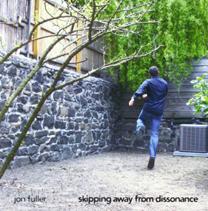The Graham Weekly Album Review #1736

Click on CD Cover for Audio Review in streaming mp3 format | |
by George Graham
(Independent release As broadcast on WVIA-FM 7/31/2013)

Click on CD Cover for Audio Review in streaming mp3 format | |
(Independent release As broadcast on WVIA-FM 7/31/2013)
About the most numerous and diverse genre of contemporary music is the singer-songwriter. Arising from the 1960s folk-music scene when Bob Dylan and others started doing their own songs instead of the traditional ones, singer-songwriters have become thoroughly ubiquitous and have evolved musically in same cases light-years from the original acoustic-guitar strumming configuration. Of course, the folkies still probably represent the biggest portion of the singer-songwriter scene, but practitioners run from straight-out rock to blues to electronic pop to jazzy. This week we have a new singer-songwriter record that I suppose could be considered a kind of progressive-rock. It's by Jon Fuller, and his CD is called Skipping Away from Dissonance.
Jon Fuller is a 24-year-old Queens, NY resident with a classical music background. His main instrument is piano, and he had 10 years of classical piano studies in growing up, and also took four-years of classical vocal performance. He graduated from Vassar and released two previous EPs of his music, going back to 2009. In addition to his own music, his bio says that he has a passion for opera and musical theater, and he has done such vocal performances over the years, including singing in the debut of a new operatic work. So not surprisingly, one can hear the classical influence from time to time, with things like orchestral arrangements involving strings, some real and much if it created by respectable synthesizer playing.
This is not the first time we have had an art-rock styled singer-songwriter. In the past year or so, we have spotlighted recordings by Gabriel Kahane and My Brightest Diamond, featuring Shara Worden. Both also have classical backgrounds, and represented interesting combinations of genres. Jon Fuller's music does not involve so much of the orchestral instrumentation. Instead, the sound is somewhat retro in a way, recalling the art rock compositional style of bands like Genesis with their complex form and shifting meters, and the kind of theatrical aspect of some of the old rock operas. Fuller's vocal style is quite appealing, his formal training apparent in his great control, through he does not sign in an operatic style. Lyrically his compositions run from fairly conventional love-song words to more philosophical, and are generally thoughtful and literate, though originality in his words is probably not his strongest point.
Fuller plays most of the instruments himself together with his producer/engineer Christopher Connors. There are some orchestral players brought in for a couple of the tracks.
Leading off is a piece called Gathering Tide which establishes the direction for the album's music. After a piano introduction the piece gets into a kind of classic art rock mode. It's nicely done and recalls the golden age of prog-rock. <<>>
A track called Time Machine features the sci-fi/philosophical lyrics that were also often a part of the progressive rock scene. It sounds somewhat dated, but it's also well-written and performed. <<>>
One of the most appealing tracks on the album is Little Green Monsters, done a danceable 6/8 beat that recalls African pop. <<>>
Perhaps the most straight-out love song on the album is called, appropriately, Love Snuck In. It puts Fuller in a more laid-back mode that highlights his appealing vocals. <<>>
Another highlight on the album, both musically and lyrically, is Bitter End. It also echoes the progressive rock era with its mostly seven-beat rhythm and art-rock style instrumentation. <<>>
There are a couple of tracks that lean toward more contemporary pop sounds, including some cliches. One is Better Brain. But the track still has its more original moments. <<>>
Another of the more interesting tracks is a piece with the startlingly original title I Love You. It begins with an electronically enhanced a cappella section <<>> before building in momentum into a kind of progressive rock love song. <<>>
The CD ends with the track featuring the orchestral players, More Joy. Fuller's classical experience comes to the fore in this excellent song that also highlights Fuller's great vocals that are just right for this kind of piece. <<>>
Jon Fuller's new CD Skipping Away from Dissonance is a very nice new recording that combines the singer-songwriter genre with progressive or art rock. With his classical background, Fuller brings musical complexity to his compositions while keeping it tuneful and sonically interesting. His vocals are also outstanding, with a pleasing quality and great execution. The one little fly in the ointment to the high quality of this recording is the notably out-of-tune acoustic pianos.
Our grade for sound quality is a "B-plus." The sound is generally clean and everything is in about the right proportion on the mix, but we'll do our usual deduction of points for the volume compression used in mixing or mastering that robbed the recording of a fair amount of its dynamic range.
The singer-songwriter genre and the progressive rock sound would not seem to be readily compatible. Lately we have featured a handful of recordings that manage to combine the two, even in this age when progressive rock was long thought to have died out. Jon Fuller's Skipping Away from Dissonance is an impressive and enjoyable record that also skillfully fuses the two.
(c) Copyright 2013 George D. Graham. All rights reserved.
This review may not be copied to another Web site without written permission.
 To Index of Album Reviews | To George Graham's Home Page. | What's New on This Site.
To Index of Album Reviews | To George Graham's Home Page. | What's New on This Site.